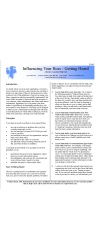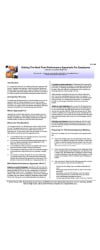Meaningful Work Requires Employees Know What’s Expected
We’ve known all along that employees who believe their work is important, and know what is expected of them will tend to be much better employees than their confused brethren. How do you go about making expectations clear, and motivating?
Challenges In Creating Clear Expectations
- Job responsibilities change all the time, hence the inclusion of “other tasks as assigned” in most job descriptions. Therefore, goal setting conversations, or any other conversations about expectations MUST BE ONGOING, rather than a once a year process.
- Because job responsibilities and priorities can change day by day, or even hour by hour, and because employees, even in the same “job” often do quite different job tasks, depending on where their strengths lie, you CANNOT rely on job descriptions as a means to promote clear expectations. Only direct, ongoing communication between manager and employee can establish those clear expectations in a crazy, even unpredictable world.
Actions To Promote Clear Expectations
Establish clear expectations that are mutually negotiated as part of an overall yearly goal discussion process with each employee. Both in my books and articles, I suggest ways of managing performance so that both manager and employee are on the same page regarding:
- job responsibilities and how each fits into the overall goal achievements of the work unit, and the overall organization.
- what constitutes good performance and poor performance (what is wanted, what is unwanted).
- authority levels (what employees can do on their own, and when they need “approvals”) .
- how the employee’s job meshes with and supports the work that other people do in the organization, peers, other departments, etc.
- what resources are at the disposal of the employee that can be drawn upon, and when and how they can be used.
- Regular and frequent conversations about how the work is going, and how priorities need to be altered due to various circumstances. Depending on the job, these conversations can happen weekly, daily, or even several times during a day as necessary.
Informal Discussions Trump “Formal” Goal Setting When It Comes To Clear Expectations
Managers have a tendency to think of “goal setting” as a once a year, formal process that might go into an employee file. This usually doesn’t work, because in fact, the best way to clarify expectations is in a dynamic ongoing way — an informal communication process.
That’s not to say that the annual goal or objective setting process should be abandoned. The point is, though that if you want clear expectations, you need to work at it by opening up communication channels so information can flow from the manager to the employee and back.
Conclusion: Clear Expectations
There are two huge reasons why establishing clear expectations is essential to increase productivity. First, it’s pretty obvious that the better employees understand their jobs, and what is expected, the better they will be able to do their jobs.
The second reason is that if we want employees to see the meaning of their work tasks, and thus be able to motivate themselves to contribute to the attainment of goals larger than the ones they are responsible for, they need to know what is expected. An employee who is confused about his or her job responsibilities cannot possibly commit to them and to the achievement of “bigger” goals. You want a sense of contribution. If employees don’t know WHAT or HOW to contribute this can’t happen.






